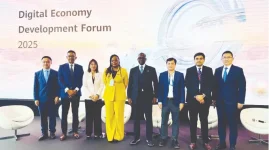Zimbabwe showed off big tech plans at the Mobile World Congress in Barcelona this year. The country wants to transform how students learn and how people connect. These efforts mark a fresh step toward making Zimbabwe more modern and tech-friendly. Every move aims to help the country grow faster and smarter.
The most exciting news came when Zimbabwe joined the GigaProject program. This plan will connect 6,611 schools across the country using solar power systems. Many rural areas face electricity problems that make internet access hard. Solar energy solves this by giving schools reliable power without harming the environment. Students everywhere will gain equal chances to use online learning tools.
Zimbabwe didn't just talk about school internet - they discussed artificial intelligence and cyber safety with experts from around the world. Learning from global leaders helps Zimbabwe create better plans for its future. AI could make healthcare, farming, and money management work better for everyone. The country also wants strong protection against hackers as more people go online.
Government officials spoke on panels with ministers from Uzbekistan, Madagascar, and Malaysia. These friendships help Zimbabwe learn new ideas and find investors for tech projects. Sharing knowledge makes plans stronger and more likely to succeed. Working with other countries brings fresh thinking to local challenges.
All these digital plans should create jobs and spark new business ideas across Zimbabwe. The government wants companies to partner with them on tech projects instead of working alone. Foreign businesses might invest more money when they see how serious Zimbabwe is about technology. This puts the country in a better position to compete globally.
Zimbabwe has started a complete digital makeover that touches education, business, and daily life. These changes match worldwide goals for better living standards and stronger economies. The country wants to stay important in a world where technology matters more each day. Every step forward helps prepare citizens for success in our connected world.
Making these changes won't be easy, especially in far-away villages and towns. For years, money must flow toward internet equipment and training programs. People need to learn computer skills and stay safe from online threats. The rewards make these efforts worthwhile—better government services, more open information, and more power for regular citizens.
Zimbabwe showed bold ideas at the Mobile World Congress that paint a bright future. The solar-powered school internet project proves how creative the country can be. Leaders call for everyone - government workers, business owners, community groups, and regular people - to help build this new digital Zimbabwe. Together, they can create a fair, lasting, and rich tech future for all Zimbabweans.
The most exciting news came when Zimbabwe joined the GigaProject program. This plan will connect 6,611 schools across the country using solar power systems. Many rural areas face electricity problems that make internet access hard. Solar energy solves this by giving schools reliable power without harming the environment. Students everywhere will gain equal chances to use online learning tools.
Zimbabwe didn't just talk about school internet - they discussed artificial intelligence and cyber safety with experts from around the world. Learning from global leaders helps Zimbabwe create better plans for its future. AI could make healthcare, farming, and money management work better for everyone. The country also wants strong protection against hackers as more people go online.
Government officials spoke on panels with ministers from Uzbekistan, Madagascar, and Malaysia. These friendships help Zimbabwe learn new ideas and find investors for tech projects. Sharing knowledge makes plans stronger and more likely to succeed. Working with other countries brings fresh thinking to local challenges.
All these digital plans should create jobs and spark new business ideas across Zimbabwe. The government wants companies to partner with them on tech projects instead of working alone. Foreign businesses might invest more money when they see how serious Zimbabwe is about technology. This puts the country in a better position to compete globally.
Zimbabwe has started a complete digital makeover that touches education, business, and daily life. These changes match worldwide goals for better living standards and stronger economies. The country wants to stay important in a world where technology matters more each day. Every step forward helps prepare citizens for success in our connected world.
Making these changes won't be easy, especially in far-away villages and towns. For years, money must flow toward internet equipment and training programs. People need to learn computer skills and stay safe from online threats. The rewards make these efforts worthwhile—better government services, more open information, and more power for regular citizens.
Zimbabwe showed bold ideas at the Mobile World Congress that paint a bright future. The solar-powered school internet project proves how creative the country can be. Leaders call for everyone - government workers, business owners, community groups, and regular people - to help build this new digital Zimbabwe. Together, they can create a fair, lasting, and rich tech future for all Zimbabweans.












